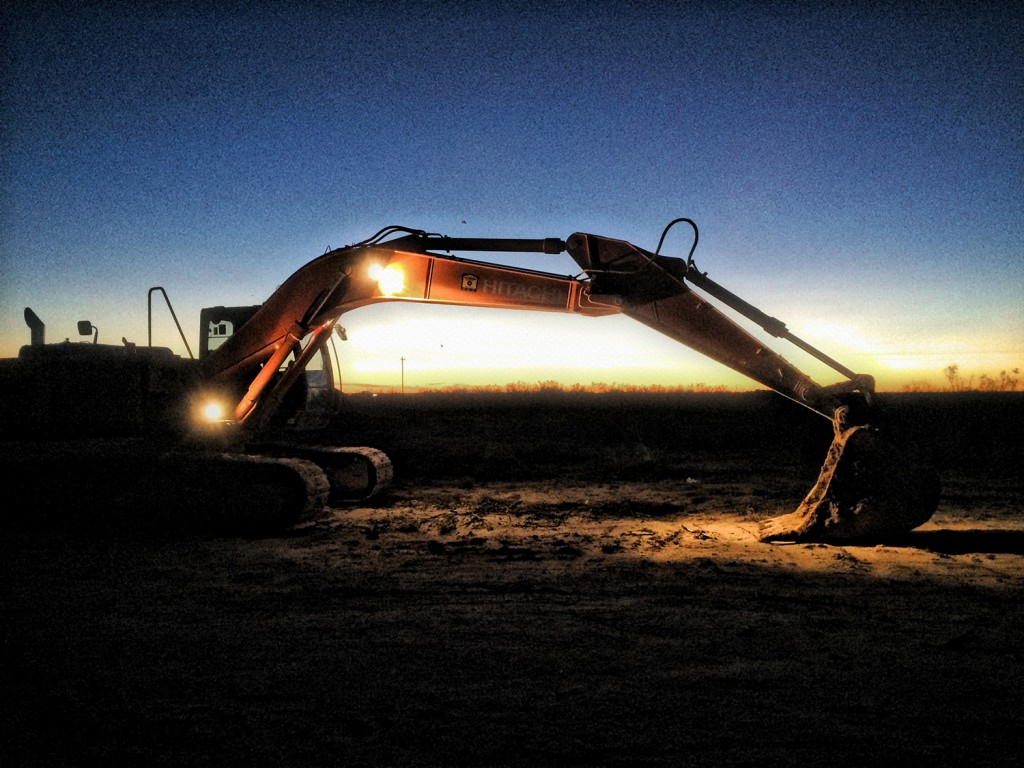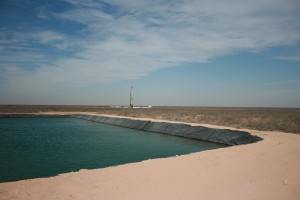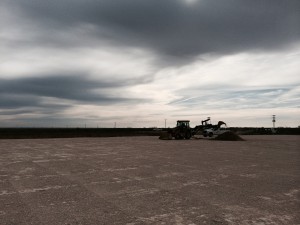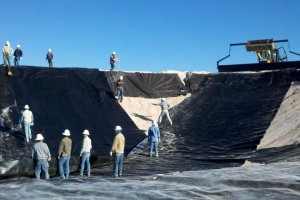Some layoffs, efficiency improvements, and price decreases keep area dirt movers from being buried alive.
By Paul Wiseman
“This slowdown has been different [from the 2009 downturn] because it has affected a lot more people this time,” said Nick Tomlin, vice president of Big D Companies. With approximately 280 employees, Big D is one of the larger independently owned oilfield service companies in the area. Dirt work is one of their largest services.
Tomlin continued, “I think what had happened to us, this boom that we were in had lasted a little bit longer, therefore a lot more people were involved in it—kinda like a gold rush. Word’s out, so people come in.” Tomlin’s observation is given weight when considering that the U. S. Census Bureau estimated Midland County’s growth rate between 2010 and 2014 at 13.8 percent, bringing the county’s population to 155,830. The county’s 2010 population was 136,875.
Big D has kept as busy as possible during the first half of 2014, taking care of cleanups, road repairs, and other jobs for which there was not time during the boom. Still, it has had to lay off approximately one third of its boom-time workforce, a count of 140 people. Although the first employees to go were the least productive, layoffs of this size have affected some good workers.
“When this thing started slowing down, back in October and November, we were all [service companies in general] probably 15 percent ‘overweight.’ We had a little too much fat on the steak there that we had to get trimmed off.”
But, Tomlin continued, “Once you get to 140 employees, you’ve got a bunch of good people in there, too.” Those layoffs are the hardest part of his job. “We had to let people go that had been with our company several years. “You’re dealing with families—you’re dealing with peoples’ occupations that feed their families, and there’s just a lot to that.”
On the positive side, with the late spring price rebound, Tomlin said the company has begun to rehire some of those employees, at least in the water storage and transfer division, as fracturing and completions begin to ramp up. “I think we’re seeing a change in momentum now,” he said.
In the $60 vicinity, prices are high enough to allow those completions to begin to move, but not generally sufficient to give producers the confidence to move full speed ahead on drilling or other projects. All of this makes budgets and planning a real headache for companies like Big D.
“There’s no way you can plan,” Tomlin said. “Our planning is done day-to-day. Derrick [Big D’s Construction Manager Derrick Nicholas] and I are constantly talking on a daily basis, adjusting our employees, adjusting our equipment, adjusting our work load every day. Sometimes that changes during the day.”
Although change may be more rapid now, the industry has been in a continual state of change and growth over the years since Nick Tomlin’s father, Don “Big D” Tomlin founded the firm in 1977, and the company has grown and changed with the industry as a whole.
Earth moving was always a significant part of the business, with its first services including the lining of reserve pits for the oil industry. They also created landfill pits for municipalities.
The younger Tomlin noted that today’s giant frac pits, capable of storing more than a million barrels of water, have revolutionized the business while, at the same time, constituting a natural progression from the landfill earthmoving of a couple of decades past.
The advent of the huge ponds has come about mainly in the last three years, as hydraulic fracturing has become the completion procedure of choice across the nation and in the Permian Basin. “We got all our experience in building landfills—and all that experience was taken to the oilfield to build these frac pits,” Tomlin said. Frac pits actually have nothing on landfills in the size department.
Many dirt moving companies now, including Big D, use GPS technology to make the work faster and more accurate. Pads must be smooth and must have just the right grade to allow rainwater (a major need during this very wet year) to run off without washing out the pad. Tomlin says this new technology gets a drill pad “almost like a pool table… it’s that smooth.”
At somewhat the other end of the scale in the dirt work field is Diggers Oilfield Services, founded just over two years ago in March of 2013. Diggers started with company president Jason Hunt and a few friends and family members, officing out of Hunt’s home on Michigan. Now with 30-plus employees and a downtown office, Diggers is starting its third year. They began by doing dirt work on frac pits and roads, then expanded into right-of-ways, backhoe work, and saltwater disposal locations.
Office Manager Sara Anderson, Jason’s sister-in-law, said the downturn has both helped and hurt them. Regarding employees, the company let go of a few of their least productive workers and replaced them with more qualified people, without significantly reducing their staffing. “If you’re not really getting it done, we have options,” she said. “We don’t have to settle for mediocrity.”
Reduction in drilling rig counts has created a corresponding drop in location building, Anderson related, but the SWD sites, remediation, cleanup, and road work have increased enough to take up any slack. The advent of what one might call a monsoon season has boosted road repairs and cleanup work. It has also created opportunities to pull rig trucks out of the mud, while also creating hindrances due to the fact that dirt work can’t be done in a downpour.
About 18 months ago, Diggers leadership saw an opportunity to expand beyond the oilfield itself, learning that many commercial projects were held up for months waiting on dirt work. With this season’s downturn, that expansion is looking better and better. They have done a good number of jobs in 2015 already and have more in the pipeline.
“Word-of-mouth has gotten around, that we do good work on commercial jobs, and we’re getting invited to bid as we walk through, so we don’t have to search it out nearly as much,” Anderson said. Diggers now has a fulltime salesperson with a commercial background selling those jobs.
Here is where low oil prices are actually helping, she said, because they have helped push construction costs down, motivating developers to get more work done at those lower costs. Plus, the wait for workers is much shorter now.
Diggers itself has lowered prices, creating competitively priced packages in order to win bidding wars—something that was unheard of a year ago. This is a chain reaction—Diggers negotiated lower prices from their own vendors and through consolidations and “working smarter” became more efficient. During the boom, Anderson feels costs had gotten out of proportion, so she is glad to see “more reality pricing” taking hold.
Improvements in efficiency should continue to pay dividends after prices come back up. “We were already organized, we already had a good system and structure, but when things like this happen you start looking at every fine line and try to find ways to become better organized. Once they’re implemented, as the prices go up, you’re still there, so you’re only going to benefit from it.”
Attrition has helped keep Diggers and other oilfield-focused companies busy. Companies that had done road work somewhere else, then opened a branch in the Permian Basin during the boom, were among the first to give up and leave, she said. This leaves more of the remaining work to the locally focused firms. “I don’t think they’re going to come back, either,” she said, adding, “I think companies that are staying and are making it through this are going to be the ones that are going to stay around for a very long time.”
No one doubts the pain and financial strain caused by the boom-and-bust nature of the oil patch. But even during the pain cycle, most companies that are in it for the long haul are able to see downturns like this one as opportunities to catch up, tighten up, and gear up for the next boom—something that is just as surely in the pipeline as West Texas Intermediate.
Paul Wiseman is a freelance writer in Midland. His email address is fittoprint@sbcglobal.













